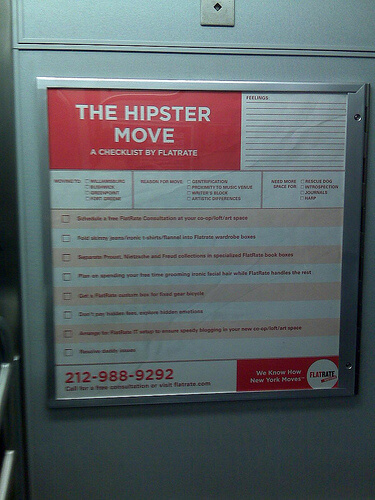A Hipster Is Just Someone You Hate


Credit: Quinn Norton on Flickr
Because subway commutes are also occasions to consider advertising stratagems in great detail, I have spent a good part of every morning on the A train deconstructing one poster in particular: “The Hipster Move,” an ad for Flatrate Moving proclaims on a faux checklist. Steps include “separate Proust, Nietzche, and Freud collections,” “fold skinny jeans/ironic t-shirts/flannel,” and “resolve daddy issues.”
It is, as New York Magazine wrote when the posters began appearing in 2009, the kind of campaign that identifies a New York phenomenon and then fails to correctly parse it. By 2009, the age of the hipster was already in steep decline. In 2010, n+1 published “What Was the Hipster?” a eulogy for the once counter-cultural figure that had been thoroughly chewed up and expectorated by the culture.
But in 2014, like the cupcake, the term “hipster” seems like a remnant of Bloomberg-era New York. The term no longer refers to a subset of people in a specific area, or the aesthetic of a particular subculture. It has been diluted to be all but meaningless. Now, a hipster is just a word for someone you hate.
“Hipster” is not a label that anyone willingly adopts. Rarely do you meet anyone who self-identifies as a hipster. It is hurled with a faint sneer. It is a challenge to authenticity, and to motivation. It is equivalent to a contestant on a reality show calling you “fake.” It is someone who is acting in a manner you deem bizarre. It is a way of putting distance between yourself and other members of your cohort who have similar styles of dressing, talking, and acting. It is a term that denotes class. In Brooklyn, it often translates to someone doing the same thing you are but with a trust fund. It is a way of marking some people as the other. They are not from here. They have not earned it. They are less sincere. They are putting on an act.
When I was visiting my hometown in Alabama last spring, I suggested going to a bar on one side of town to a friend of mine. She rolled her eyes. “That bar is for hipsters,” she said. I protested that these were not hipsters, at least not by the traditional definition, and, anyway, well-heeled bars in Brooklyn with artists for clientele pretend that they’re in Alabama more often than ones in Birmingham pretend to be in Boerum Hill. These were yuppies, maybe. “Same thing,” she said.
And she’s right. The meaning between those two has been conflated. There is barely a distinction. Like the yuppie, the hipster is a diagnosis of the past. So why do we still use it? We can all laugh at the pretensions of this perceived group because it isn’t one that has any defenders. We can all accuse hipsters of cultural appropriation because they are more flagrant about it than we are. It is just a way of reassuring ourselves of our own essential goodness, our own down-to-earth streetwise tactics. It is a word that is toothless, exhausted, a lazy gesture that masks the other, more deeply rooted problems in our cities. The ever-widening income gap, the rolling wave of gentrification pushing middle and working class families out of their homes, those are problems that the cry of “hipster” obscures. “Hipster” is symptom, not disease. After all, it is easier to make fun of overly-groomed sideburns than it is to tackle deeply entrenched disparity.
You might also like 




















